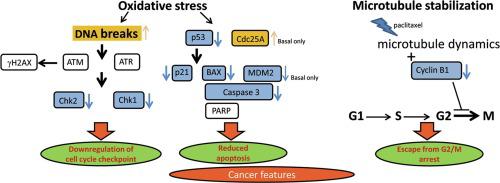BIOCHEMICAL PHARMACOLOGY ( IF 5.3 ) Pub Date : 2022-04-15 , DOI: 10.1016/j.bcp.2022.115043 Sara Cimini 1 , Giorgio Giaccone 1 , Fabrizio Tagliavini 2 , Matteo Costantino 3 , Paola Perego 3 , Giacomina Rossi 1

|
Tau is a microtubule-associated protein, coded by the MAPT gene, which regulates microtubule (MT) polymerization and dynamics. Due to its key role in neurons, it is a major player in neurodegenerative diseases known as “tauopathies“. Since tau has emerged as a multitasking protein with a role in genome stability, it may act both in neurodegeneration and cancer. After demonstrating that tau can be considered as a risk factor for cancer, here we explored the mechanisms linking mutated tau to dysregulation of cancer-relevant processes, by employing lymphoblastoid cell lines (LCL) from patients affected by genetic tauopathy carrying the MAPT P301L mutation and healthy controls (wild-type, wt). In mutated LCL, we found reduced sensitivity to MT perturbation, along with decreased G2/M accumulation and cyclin B1 levels. Furthermore, mutated LCL displayed lower levels of phospho-Chk1 and phospho-Chk2 following hydrogen peroxide-induced oxidative stress, indicating a poorly effective DNA damage checkpoint, as well as reduced basal levels of p53. Such cells also exhibited lower levels of Bax and cleaved caspase-3, and increased levels of Cdc25A, upon oxidative stress, accounting for diminished apoptosis.
Overall, these findings point to tau as a key player in biological pathways relevant for cancer, as evidenced by the differential response of mutated and wt cells to MT and DNA perturbation. The modulation of p53 is intriguing given its function as guardian of the genome.
中文翻译:

P301L tau 突变导致细胞周期、DNA 损伤反应和细胞凋亡的改变:tau 在癌症中作用的证据
Tau 是一种微管相关蛋白,由MAPT基因编码,可调节微管 (MT) 聚合和动力学。由于它在神经元中的关键作用,它是被称为“tau蛋白病”的神经退行性疾病的主要参与者。由于 tau 已成为一种在基因组稳定性中发挥作用的多任务蛋白质,它可能在神经退行性变和癌症中都起作用。在证明 tau 可被视为癌症的危险因素后,我们在此探索了将突变的 tau 与癌症相关过程的失调联系起来的机制,方法是使用来自携带MAPT的遗传性 tau 病变患者的淋巴母细胞系 (LCL)P301L 突变和健康对照(野生型,wt)。在突变的 LCL 中,我们发现对 MT 扰动的敏感性降低,同时 G2/M 积累和细胞周期蛋白 B1 水平降低。此外,突变的 LCL 在过氧化氢诱导的氧化应激后显示出较低水平的 phospho-Chk1 和 phospho-Chk2,表明 DNA 损伤检查点效果不佳,以及 p53 的基础水平降低。这些细胞在氧化应激时也表现出较低水平的 Bax 和裂解的 caspase-3,以及增加的 Cdc25A 水平,从而导致细胞凋亡减少。
总体而言,这些发现表明 tau 是与癌症相关的生物途径中的关键参与者,突变和 wt 细胞对 MT 和 DNA 扰动的不同反应证明了这一点。鉴于其作为基因组守护者的功能,p53 的调节很有趣。































 京公网安备 11010802027423号
京公网安备 11010802027423号